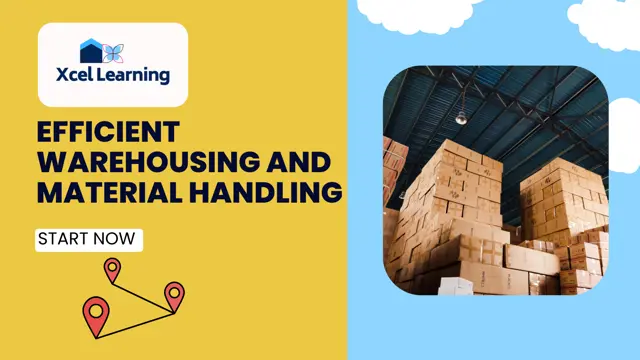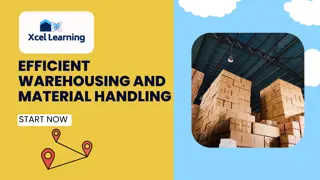
Efficient Warehousing and Material Handling
Free Course: Accounting Fundamentals | 24/7 Support | Free Digital Certificate | Lifetime Access
Xcel Learning
Summary
- Reed Courses Certificate of Completion - Free
- Tutor is available to students
Add to basket or enquire
Overview
Efficient Warehousing and Material Handling courses are essential for optimising the storage and movement of goods in the supply chain. These courses provide fundamental knowledge and skills for professionals in logistics and warehousing. They cover topics such as inventory management, space utilisation, safety protocols, and the use of technology in warehouse operations.
The importance of such courses lies in their ability to enhance productivity and reduce operational costs. Efficient warehousing ensures faster order fulfilment, reduced errors, and improved customer satisfaction. Proper material handling techniques reduce the risk of damage to goods and minimise workplace injuries. In a globalised marketplace, efficient warehousing and material handling play a pivotal role in maintaining a competitive edge. These courses are critical for individuals seeking careers in logistics and supply chain management, as they provide the expertise needed to excel in these fields.
Curriculum
-
Introduction to Warehousing and Material Handling 07:00
-
Warehouse Layout and Design 07:00
-
Material Handling Equipment 07:00
-
Inventory Management in Warehousing 06:00
-
Warehouse Operations and Processes 06:00
-
Warehouse Management Systems (WMS) 07:00
-
Safety and Regulatory Compliance 06:00
-
Sustainability and Green Warehousing 06:00
-
Performance Metrics and Key Performance Indicators (KPIs) 07:00
-
Case Studies and Best Practices 07:00
-
Future Trends in Warehousing and Material Handling 07:00
-
Additional Course: Accounting Fundamentals 54:00
Course media
Description
Discover the Exciting Topics Awaited in this Enriching Course:
Module 1: Introduction to Warehousing and Material Handling
- Understanding the role of warehousing in the supply chain
- Importance of efficient material handling
- Historical overview of warehousing
Module 2: Warehouse Layout and Design
- Warehouse layout principles
- Factors influencing warehouse design
- Implementing space optimization techniques
Module 3: Material Handling Equipment
- Types of material handling equipment (e.g., forklifts, conveyors, pallet jacks)
- Selection, maintenance, and safety considerations
- Automation and technology in material handling
Module 4: Inventory Management in Warehousing
- Inventory control techniques
- ABC analysis and inventory categorization
- Cycle counting and physical inventory
Module 5: Warehouse Operations and Processes
- Receiving, putaway, and order picking processes
- Cross-docking and just-in-time (JIT) practices
- Quality control and inspection
Module 6: Warehouse Management Systems (WMS)
- Introduction to WMS
- Implementation of WMS for efficient operations
- Benefits and challenges of using WMS
Module 7: Safety and Regulatory Compliance
- Warehouse safety best practices
- OSHA regulations and compliance
- Handling hazardous materials
Module 8: Sustainability and Green Warehousing
- Sustainable warehouse practices
- Reducing energy consumption and waste
- Eco-friendly packaging and material handling
Module 9: Performance Metrics and Key Performance Indicators (KPIs)
- Measuring warehouse efficiency
- KPIs for evaluating material handling and warehousing performance
- Continuous improvement strategies
Module 10: Case Studies and Best Practices
- Real-world case studies of successful warehousing and material handling practices
- Guest speakers from industry experts
- Group discussions and analysis of best practices
Module 11: Future Trends in Warehousing and Material Handling
- Emerging technologies in warehousing
- Robotics and automation trends
- Preparing for the future of warehousing
Get a free "Accounting Fundamentals" course alongside this one. Unlock Your Potential Today: Join Us and Earn Your Digital Certificate Upon Course Completion – On the House!
Who is this course for?
This course is designed for professionals and organisations involved in logistics, warehousing, and supply chain management. It caters to individuals seeking to optimise their understanding of efficient warehousing and material handling practices, enabling them to enhance operational productivity, reduce costs, and improve overall supply chain efficiency.
Questions and answers
Currently there are no Q&As for this course. Be the first to ask a question.
Certificates
Reed Courses Certificate of Completion
Digital certificate - Included
Will be downloadable when all lectures have been completed.
Reviews
Currently there are no reviews for this course. Be the first to leave a review.
Legal information
This course is advertised on reed.co.uk by the Course Provider, whose terms and conditions apply. Purchases are made directly from the Course Provider, and as such, content and materials are supplied by the Course Provider directly. Reed is acting as agent and not reseller in relation to this course. Reed's only responsibility is to facilitate your payment for the course. It is your responsibility to review and agree to the Course Provider's terms and conditions and satisfy yourself as to the suitability of the course you intend to purchase. Reed will not have any responsibility for the content of the course and/or associated materials.


